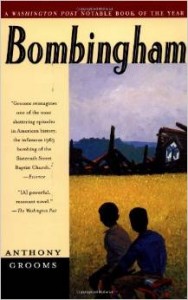

The effects of the murders will be heavy on the families of the murdered, obviously, but in an unexpected move, Grooms explores the effects on other, essentially peripheral, figures. Not only did their service fail to advance their position in the Jim Crow South, as they had expected, it made that position worse as white men resented the blacks' patriotism and feared their confidence gained in battle. Through Bertrand, Grooms takes up the disturbing issue of the treatment of returning black veterans. Presiding at the lynching is Vernon Venable, a local planter and bigot, and Sheriff Cook, both stock characters in this sadly familiar drama.īut Grooms moves on from what has become almost a dramatic set piece to a savvy exploration of several psychological and cultural problems.īertrand Johnson, one of the victims, is a thoroughly good man-a black teacher who had served with distinction in North Africa and Italy in WWII and had crossed some racial lines to befriend Lonnie's father, Wayne, who suffered from PTSD, and then generously help Lonnie and his mother through some hard times. Lonnie knows the two black couples being murdered and knows them to be law-abiding, even admirable people. The women are "chatting and laughing,” the men drinking beer an entrepreneur had brought to sell at the event.

In a grotesque scene with a complicated backstory, two black men and two black women are kicked, spat on, beaten and, finally, shot, while a crowd of white men and women observe, celebrating. The novel opens when ten-year-old Lonnie Henson, a white boy, accidentally witnesses a lynching, more accurately, a public mass murder. In Grooms’ novel, changes of heart, changes of attitude are crucial, not in the religious sense, to earn a blissful afterlife, but to make life more humane right here. We must not in fact continue obstinately in the same ways. Peter who declares that tradition, like silver and gold, can be a "vain conversation" and will not redeem the soul.

The "conversation" of the title refers to the First Epistle of St. Now we have a new novel, "The Vain Conversation," set mainly in Georgia in the late 1940s and based very loosely on an actual event. Perhaps for these reasons, there has been no fiction since 2001. Since 1994 Grooms has taught at Kennesaw State University in Georgia, with stints in Sweden and Ghana, and has been very active in the Georgia literary scene. He has also published a volume of poetry and a children's book. In 1995 his story collection "Trouble No More " won the Lillian Smith Award, given to a book that explores issues of race and social justice, and then his novel "Bombingham" (2001) also won that award. Publisher: The University of South Carolina Press, Story River BooksĪnthony Grooms' career got off to a most auspicious beginning.


 0 kommentar(er)
0 kommentar(er)
